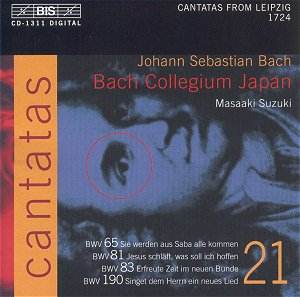Volume 21 in the ongoing cycle of cantata recordings
by Masaaki Suzuki and the Bach Collegium Japan contains four cantatas
written in Leipzig in 1724. This disc includes a curiosity: the
first and second movements of cantata BWV 190 were reconstructed,
one by Masaaki Suzuki and the other by his son Masato Suzuki.
In addition, these cantatas feature only male soloists, though
none of them are solo cantatas; all three soloists sing in each
cantata.
It is increasingly difficult to review the discs
in this series. The quality of these performances and recordings
is consistently high, and Masaaki Suzuki, in my opinion, is the
best conductor of Bach's cantatas today. His control of the choir,
the subtle qualities of the instrumentalists, and his choice of
soloists is generally excellent. His group, the Bach Collegium
Japan, has developed a great deal of experience with these works,
having traversed one-third of the cantatas, as well as recording
and touring with the two Passions.
Some of the highlights of this recording are
Robin Blaze's aria Jesus Schlaft, was soll ich hoffen? in BWV
81, a fine aria with flute obbligato and a rich continuo. It is
good to hear Blaze again; the alto in Volume 20 was very good,
but I find Blaze's voice to be ideal for these works. This entire
cantata is dense; there are none of the arias where a soloist
sings with a small continuo group.
Like cantata BWV 81, BWV 83 opens with an aria
for alto, reminiscent of some of the festive movements in the
Christmas Oratorio, and the horns and oboes give it that extra
energy that heightens the mood. The tenor aria is excellent (James
Gilchrist sings very well here), but this is a strangely unbalanced
cantata with three first movements ranging from around 4 minutes
to almost 7 minutes each followed by a brief recitative and short
chorale, each less than one minute.
Cantata BWV 190 leaves room for debate. With
the first two movements reconstructed, one can certainly question
the validity of the choices made. The vocal scores exist, but
the remainder of the music for these movements was recreated.
Suzuki gives detailed justifications for his choices in the liner
notes (and I finally bought a magnifying glass to be able to read
them; the font size used for these notes is ridiculously small),
but the proof is indeed in the eating. They are certainly convincing
enough, and sound like Bach. The opening chorus is the most demanding
of the two movements. The second movement is a simpler recitative
and chorale, which tends to follow more easily discernable rules
in Bach's cantatas. Of course, one cannot listen to them without
the realization that they are not authentic, but this in no way
lessens the pleasure.
Overall, cantata BWV 190 is a fine work, with
some fine arias, such as the alto aria Lobe, Zion, deinen Gott
... and the duet for tenor and bass Nun, Jesus gebe ... The latter
is one of those great Bach arias with a small continuo (cello
and organ) and a solo instrument playing obbligato (violin).
Yet again, Maasaki Suzuki shows his strength
in interpreting and recording Bach's cantatas. This is another
fine disc, and a must-have addition to any collection of cantatas.
Kirk McElhearn
Visit the Bach
Collegium Japan webpage for reviews of other releases
in this series
